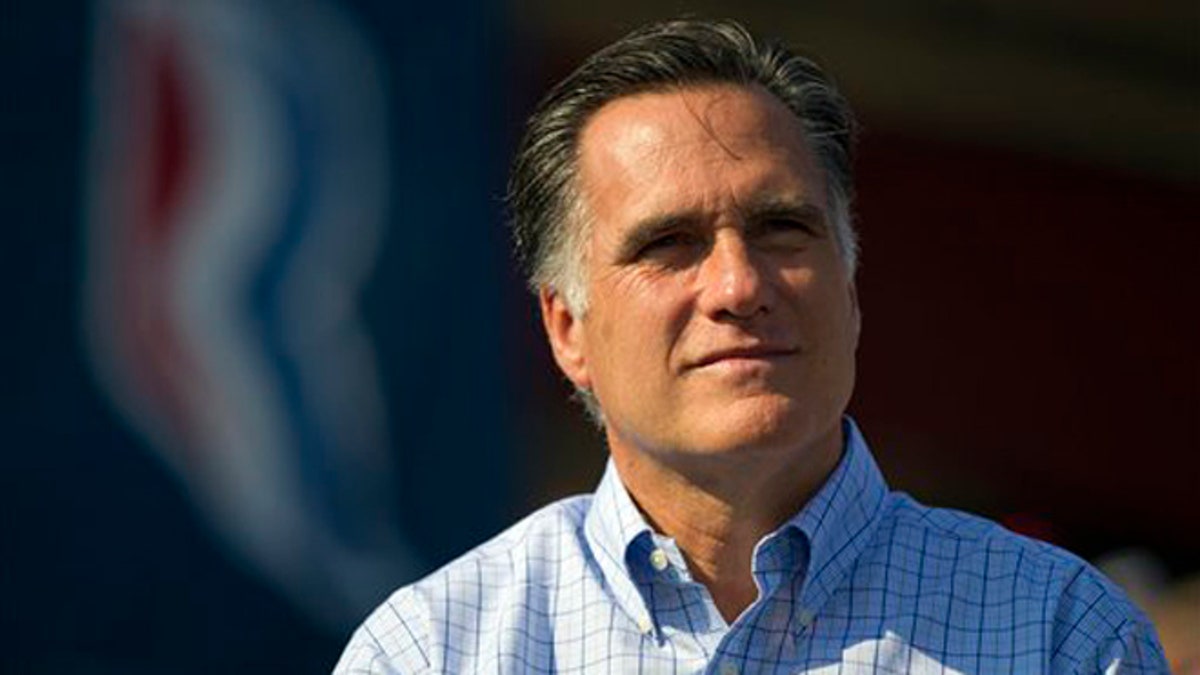
Aug. 25, 2012: Mitt Romney listens as vice presidential running mate Rep. Paul Ryan, R-Wis., not pictured, speaks during a campaign rally in Powell, Ohio. (AP)
No matter when the Republican National Convention officially starts, it still marks perhaps the best chance for party leaders to ratchet up what has until now been bridled enthusiasm for Mitt Romney -- as he and President Obama compete for the last of the undecided voters in a very tight race.
The balloons and confetti are set to cascade inside the Tampa Times Forum when Romney accepts the nomination, as planned. And party leaders have assembled Romney’s most ardent and passionate supporters to make their case on stage about why Romney is the best choice in November to lead the country.
“This is a huge opportunity to capture the attention of the American public and keep them focused for several nights,” said Juleanna Glover, a Republican strategist and co-founder of the Washington-based Ashcroft Group.
The biggest threat to that undivided attention will almost certainly be Tropical Storm Isaac, which has already postponed the election start from Monday to Tuesday and is projected to make landfall later this week along the northern Gulf Coast states.
Glover suggested the challenge for the Romney team will be to refrain from trying to re-invent the candidate or going over the top, instead generating enthusiasm through trying to reinforce that Romney is a leader, a church-goer and a family man.
Their biggest challenge may well be in convincing Romney, a former Massachusetts governor and private-equity manager who through the entire election cycle has argued his mission is to fix the economy not win a popularity contest.
The mantra even wore off on some of the Republican Party’s most influential leaders, including House Speaker John Boehner, who in July said: “The American people probably aren't going to fall in love with Mitt Romney.”
Boehner also said Romney, who founded the Bain Capital private equity firm, “was going to do a great job even if you don't fall in love with him." But the perception was already largely in place and has, at times, remained there.
Just last week, Romney vowed in The Wall Street Journal that he won’t be part of the celebrity-style culture often favored by politicians.
Voters, Romney suggested, are most interested in hiring a fix-it specialist for an ailing economy. And when he appeared before crowds at campaign stops, he doesn’t think, “What can I do here to portray myself in a way that would be appealing to the public?” Romney told the paper.
Romney’s favorability rating is now at 46 percent, according to an averaging of polls by the Real Clear Politics website. It was as low as 21 percent according to a CBS-New York Times poll in January and as high as 50 percent according to a CNN-Opinion Research poll this month.
While Glover suggests a plan that focuses on reinforcing Romney’s image, bolstered by wife Ann’s scheduled speech and the presence of their children, others have suggested the presumptive GOP nominee go further.
“He needs to sell himself, (Romney) the man, his vision for the country,” Jonathan Collegio, spokesman for the Super PAC Crossroads GPS, told Fox News on Saturday.
Earlier in the day, John Sununu, a former New Hampshire governor and Bush administration chief of staff, suggested Romney’s disciplined manner might not warm voters’ hearts, but his competence and capability will in the end resonate with them.
Still, Glover doesn’t think the convention is Romney’s last, best chance -- calling it just “one of several bites of the apple” and suggesting that the presidential debates this fall could be the turning point.
“They are highly dynamic situations,” she said. “Debates are more pivotal than conventions.”



